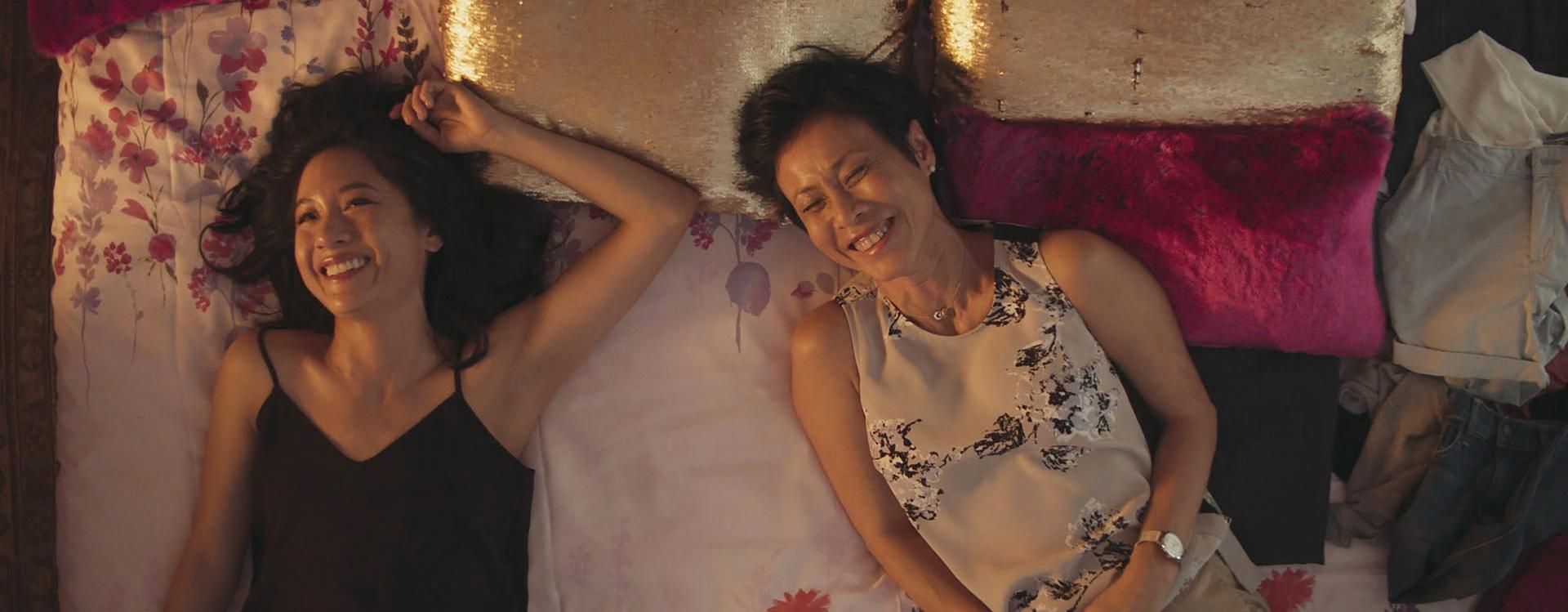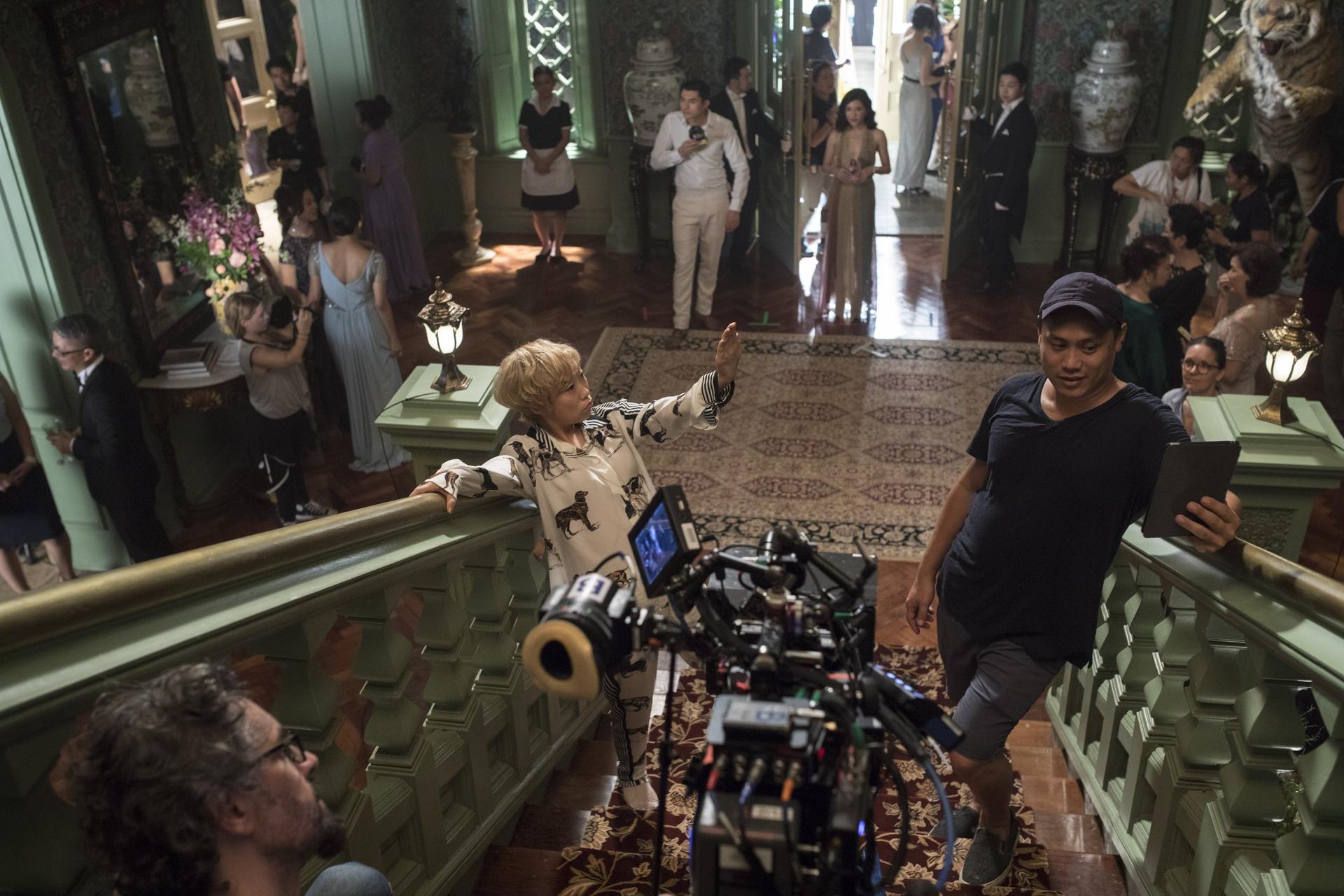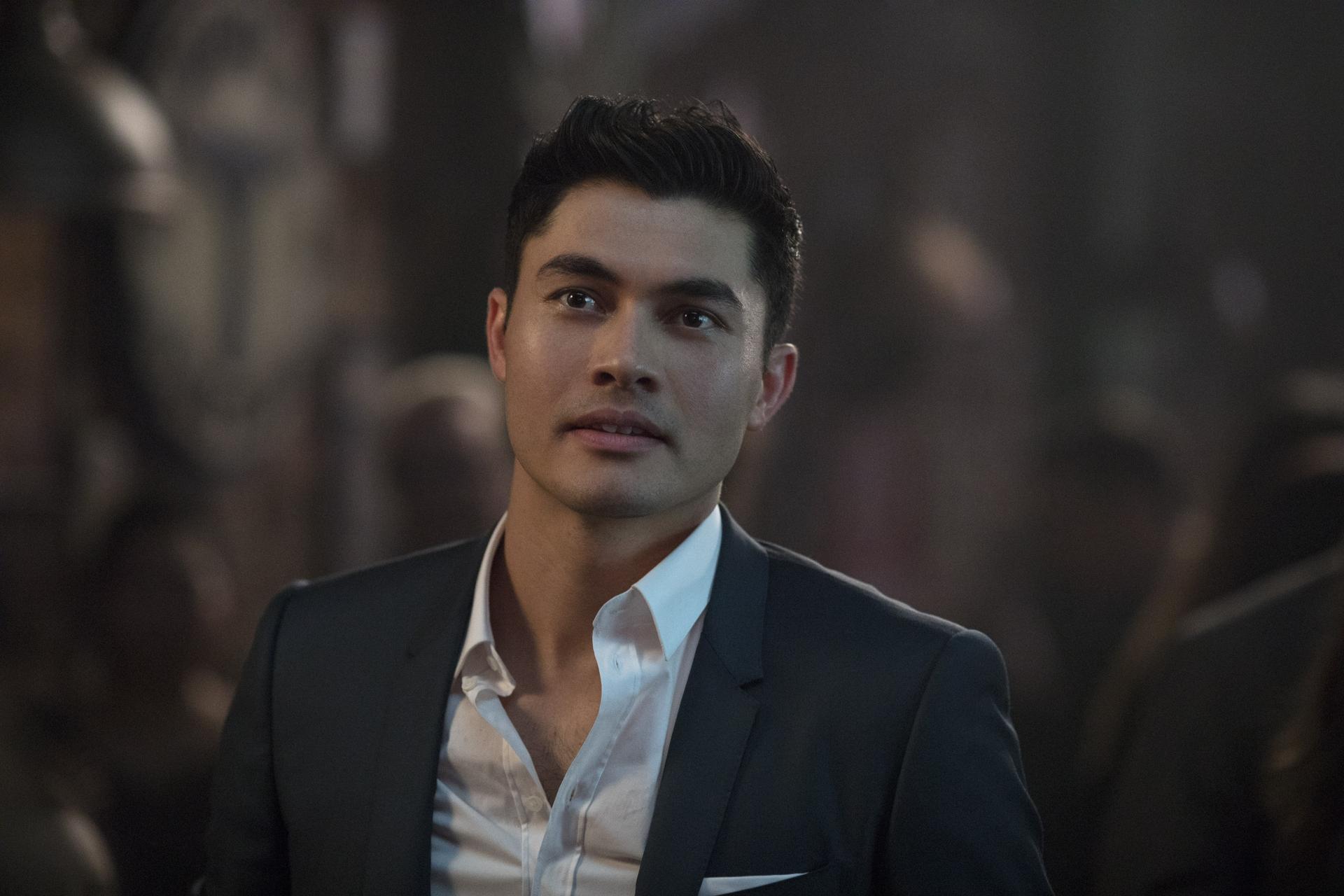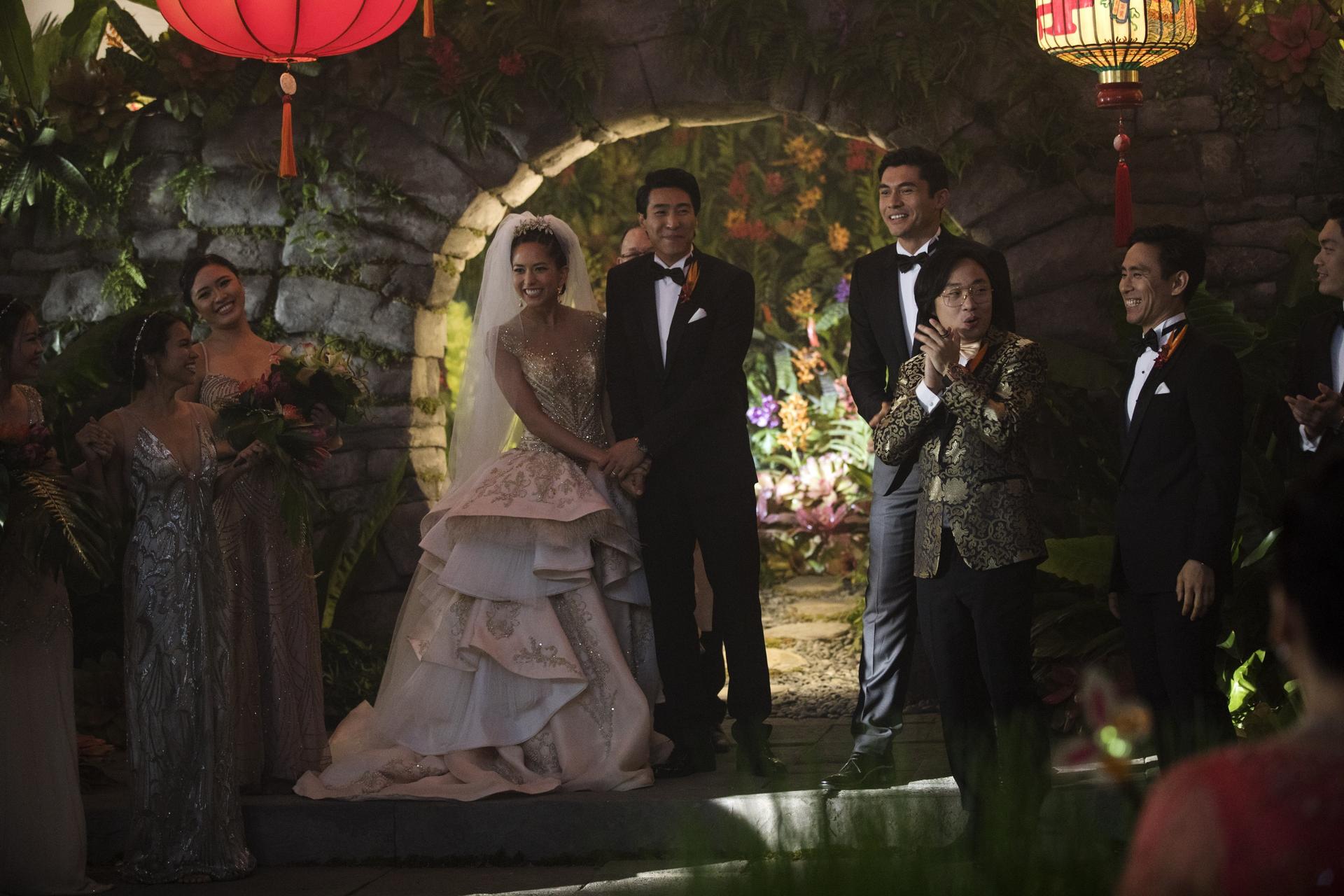What happens when you let everyone in the world audition for a Hollywood studio film
Newlyweds Araminta (Sonoya Mizuno) and Colin (Chris Pang), surrounded by Nicholas (Henry Golding), Bernard (Jimmy O. Yang) and an unnamed groomsman (Shuhei Kinoshita), at the wedding of the year in “Crazy Rich Asians.”
Like many aspiring actors, Shuhei Kinoshita works as a server at a restaurant.
One night, he took a quick break and saw an email from Warner Brothers asking if he’d be available to play a small part in the film “Crazy Rich Asians.” They had gotten his contact information from an audition video he had posted to YouTube months earlier.
“It’s the kind of thing that doesn’t register in your mind when you first read it,” says Kinoshita, who’s based in New York. “I was like, ‘Is this really happening? Is this real?’”
It was a Tuesday night, and they wanted to know if he was available to fly to Singapore that Friday.
“I was like, ‘Of course I’m available. I’ll clear my schedule for that!’” says Kinoshita.
Related: How to get beyond a tourist fantasy of Singapore
“Crazy Rich Asians,” which opens in theaters today, follows Asian American economics professor Rachel Chu (Constance Wu), who goes to Singapore for the first time with her boyfriend Nicholas Young (Henry Golding) to attend his best friend’s wedding. Little does she know, Nick has a secret.
He just happens to be from one of the most famous and wealthy families in Singapore. The wedding she’s attending is the Singaporean equivalent of the British royal wedding, and everyone wants to know who Nick, Singapore’s most eligible bachelor, is bringing as his date.
“Crazy Rich Asians,” adapted from the best-selling book by Kevin Kwan, is already being heralded for being a rare studio film that features an all-Asian cast. Director Jon M. Chu has even gone so far as to say that he wants “Crazy Rich Asians” to not just be a film, but the start of a movement for greater Asian representation in Hollywood. So there was a lot of pressure to get it right.
In early 2017, before the film began production, Chu opened up casting to the public. He put out a call on YouTube, inviting people all around the world to upload their two-minute audition videos to Facebook, YouTube or Twitter, using the hashtag #CrazyRichAsiansCasting, for a chance to be considered for a role.
Chu has a Hollywood pedigree, including directing “G.I. Joe: Retaliation,” “Now You See Me 2” and two “Step Up” movies. Usually, when he’s casting the leads, a casting director sends him a list of available actors that the studio likes, he says.
But when it comes to Asian and Asian American actors, the casting directors don’t have a big list.
“It’s not the casting directors’ fault, and it’s also not because the actors aren’t out there,” says Chu. “It’s because of the system. There aren’t that many roles for Asians, so they’re not asked to do that very often. So the lists are out of date, with people from the ‘90s. And there are people that I know are out there — because I watch YouTubers and know that there are independent films starring great Asian actors — who aren’t on these lists.”
He decided, with Warner Brothers’ support, that they needed to spend more time and money scouring the world for these actors.
The YouTube casting was just one part of a multi-arm strategy, Chu emphasizes. They involved casting directors from Vancouver to Beijing, Shanghai, Hong Kong, Australia, the UK, Malaysia and Singapore.
But by allowing anybody to audition online, they were taking away the Hollywood gatekeepers that usually get to decide who is good enough (or experienced enough) to even audition. And even if Chu couldn’t guarantee how many people they would end up casting from the Internet, he and his team made a commitment to watch them all. Thousands of videos were submitted.
“We watched every single one,” says Chu. “Me, my assistant and a couple of cast members divvied it up, and because they kept coming in, we had to keep up every day so we didn’t get drowned. We had a favorites list that we split up into characters that we thought they could fit, so we could see them compared to the actors who were submitted by agents. We even had a list that was just made up of really interesting people that didn’t fit anywhere but were compelling to look at.”
Kinoshita is one of three people chosen from the YouTube auditions. He had already submitted for the first round of casting through his agent when male actors were all auditioning for the part of Nick Young, so by the time he heard about the YouTube casting call, he suspected that many of the roles had already been cast. He had also heard rumblings that this was just a publicity stunt.
So instead of thinking of his submission as purely an audition for “Crazy Rich Asians,” he made a pitch video that also showcased himself as a range of characters that he, as an Asian American male actor, rarely had the opportunity to play in Hollywood: the “Hero Asian” who valiantly promises to fulfill a dying man’s last wish, the “Strong Asian” who knocks out his opponent in a boxing ring after a close match, the “Romantic Asian” who convinces his woman not to give up on true love.
The #CrazyRichAsiansCasting directions had instructed people to show a hidden talent in their introduction, so all of this was conveyed in the 43 seconds before Kinoshita performed the dialogue that everyone had been given to read.
“Shuhei’s video was hilarious,” says Chu. “His might have had the most production value of all the videos, playing all these roles, but you could tell he had personality — that’s what we really wanted. All the actors that were ultimately picked — from Henry Golding to Constance to Awkwafina to Ronny Chieng — were people that had confidence, because we think that confidence is contagious, and that power just radiates on the big screen.”

That onscreen confidence landed Kinoshita a role as one of the groomsmen in the big “Crazy Rich Asians” wedding. He only gets one line, but he’s grateful for that one line in the pivotal scene in a historic movie, standing right next to stars Henry Golding and Chris Pang (who plays the groom, Colin Khoo). In between takes, he hung out with singer Kina Grannis, who sings “Fools Rush In” while the bride Araminta (Sonoya Mizuno) walks down the aisle. He got to improv with “Silicon Valley” actor Jimmy O. Yang, who plays groomsman Bernard Tai, even if the footage ended up on the cutting room floor.
“It’s risky to bring on an actor with zero movie experience,” says Kinoshita. “I’m a nobody. But Jon understands how hard it is for small-time Asian American actors to get a Hollywood studio movie credit.”
Stephanie Auyeung, on the other hand, hasn’t acted since she was a kid, when she was part of the Metropolitan Opera Children’s Chorus, and she remembers being gently asked to lip-sync — not actually sing — during the songs. She currently works in human resources at New York University’s Courant Institute.
When her uncle told her about the “Crazy Rich Asians” online audition, she was excited for the chance of winning even a small role. She pointed the camera at herself in front of a white wall, with her skeptical then-fiance (now-husband) reluctantly reading the off-camera line to her. She didn’t even bother memorizing the lines. She just read them as fast as she could.
“I first did two takes and sent them to my friend, who said ‘This is terrible, redo it,’” remembers Auyeung, laughing. “So then I practiced, filmed it a couple more times, and was like, ‘Well, this is the best I can be.’”
According to Chu and Auyeung, it was Constance Wu who loved Auyeung’s audition. Because Auyeung neglected to list her last name and contact information, she was contacted by a former Warner Brothers employee who worked for YouTube and was enlisted to help find her.
Since Auyeung wasn’t part of an actor’s union, she didn’t have any lines — to her relief — but she was flown to Singapore for about a week in order to be part of a montage at the beginning of the film, where local Singaporeans are spreading the word about Nick’s new girlfriend. She’s in the closing credits as “Texting Gossip Girl.”
Auyeung was the only other person from the internet auditions who got an onscreen role in the film. But Cheryl Koh, a Singaporean Malaysian student studying at the University of Southern California, was shocked when the Warner Brothers music department contacted her almost a year after she had uploaded her audition video.
As she’s introducing herself in her video, Koh, whose stage name is Cheryl K, sings a verse of Jessie J’s “Mama Knows Best,” a song she had performed five years ago when she was a finalist on the Singaporean reality singing competition “The Final 1.”
After “Crazy Rich Asians” was already in post-production, Chu realized they needed someone to cover the song “Money (That’s What I Want)” for the film and remembered that many of the people who uploaded YouTube videos were great singers.
“I never knew those 15 seconds would land me a part in a movie,” says Koh, laughing. “I was focused on the acting part!”
Her cover of “Money” is sung in both Mandarin and English. It wasn’t until she was invited to see an early cut of the film that she realized her song was not only in the opening credits of the film, but a remixed version of her cover is played again in the closing credits. This time, it features Awkwafina, who plays Peik Lin in the film, rapping on it.
“So I not only get two credits, but one of them is a song with Awkwafina, who is my favorite character in the movie!” says Koh, who still can’t contain her excitement months later. She managed to see the movie six times before the film even opened.

Allowing the public to audition through YouTube is a strategy Chu has used before.
But this time, the process was more emotional.
“When I was watching videos, I didn’t expect to see businessmen, businesswomen and other professionals auditioning,” says Chu. “Taking time from their day, getting dressed up, getting their friends to help create a scene, editing it. Putting themselves out there publicly, knowing that their friends and family would all see it. That takes so much moxy, and I have so much respect for them.”
“Every day, we’d be crying,” says Chu. “Constance would call and say, ‘You have to watch this one.’ I just thought these are the people who would’ve gotten into acting if the opportunity was out there. But maybe this is a start to a new journey for them.”
Kinoshita — who was born in Wisconsin, moved to Japan as a kid, and came back to the US as a college student to pursue his Hollywood dream — was thinking of quitting acting before he got that email from Warner Brothers.
“It wasn’t because I didn’t think I had enough talent or that I couldn’t do it anymore,” he says. “I just didn’t believe that there were roles out there for me that were going to be worth it for the next generation to watch. I didn’t want to play any more ninjas or sushi chefs or characters that didn’t really matter in the story. I didn’t want to project those images out there anymore.”
“This casting, for me, even though it’s a small part, it really gave me hope,” he continues. “To be on a big set where a lot of Asian faces were the leads, it really made me want to be a part of the movement as an Asian American creator and actor. I think Jon really pushed through a barrier and showed us that it’s possible.”

The story of “Crazy Rich Asians” is a fairy-tale Cinderella story about Rachel Chu and her Singaporean prince. In real life, Henry Golding, who plays the prince, is the ultimate Cinderella story: a charming but relatively unknown travel host in Singapore that booked a starring role in his first-ever feature film and is now being positioned to be the next Asian male leading man.
But Chu knows that this “movement” can’t hang on one Cinderella.
“We now have one of the best databases of Asian talent who speak English,” says Chu, of actors who are primed to be cast in future Hollywood projects.
